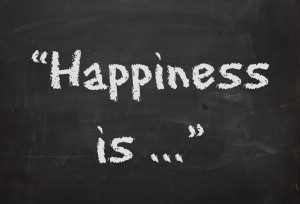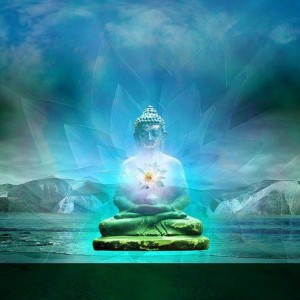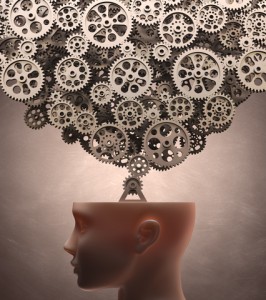It is not uncommon to hear people speak of happiness as a choice, as a state of mind. But what happens when we make happiness a goal instead of an experience? And how can we know happiness through dedication, without attaching ourselves to the outcome itself? This is not a paradox. This is the nature of MokSha in the moment.
Although proponents of Advaita may conduct experiments, it is the wonder and glory of experimentation itself they have in mind. Choice is not used to bring about particular outcomes, for this would be manipulation of what is not into being; something a lived experience of Advaita cannot assume since the only ‘transition’ to be made is from not experiencing mokSha to a lived experience of mokSha.
 If we do not choose happiness, then what is the point of choice in Advaita?
If we do not choose happiness, then what is the point of choice in Advaita?
Such an approach to life does not preclude preference for one ice-cream flavour over another. Indeed the world is full of things we enjoy, conversations we remember fondly, and places we do not visit. It is the choice process itself that differs.
In Advaita, choice is not between competing outcomes or desires. In Advaita the outcomes are part of a purpose we do not control; a reason we may not be privy to. Choice is a consciousness. The same can be said for desire. Since there is no attachment to discomfort as “bad” or pleasure as “good”, the world is organised by principles that allow this and all moments to be Brahman.
So a headache is not immediately put into the “what are we going to do to fix this problem?” pile. A headache is part of an an expression of Brahman. An expression that does not require something to be “wrong” in order to take action, and does not require something to be “positive” in order to recognise it’s sacredness. Although making choices can be difficult to explain, since the preference is for curiosity unbridled by conventional wisdom, choice itself is a simple matter of intuitive-logic.
The Experience as an Outcome
When life is no longer right-wrong, good-bad, better-worse, then some other barometer of preference must be in play. We must find new ways to navigate the everyday. Ways that do not assume the sarvagata of Brahman is available to all it’s expressions.
This is what it means to be in, but not of the world. This is the lived experience of Oneness, of mokSha in the moment!
 With no preference for riches or niceties, the Advaitist is committed to being present. It is not always easy to understand how this presence is achieved when we are so used to focusing on the outcome versus the experience. In Advaita, the outcome is the experience. Only in duality can they be separated.
With no preference for riches or niceties, the Advaitist is committed to being present. It is not always easy to understand how this presence is achieved when we are so used to focusing on the outcome versus the experience. In Advaita, the outcome is the experience. Only in duality can they be separated.
In duality, being present is an outcome: Our life must look a certain way, and we measure our success (of achieving presence) against cultural pre-conceptions. For example, in the outcome version of “being present” one does not anger or despair, one does not know pain and suffering, and one does not acquire wealth as a function of career goals. This is the image of being present. It is often a picture of clear skin, taut body, regular meditation and dedication to spiritual practice. All you need do is look at the images used in the mind-body-spirit industry’s advertising to see our cultural pre-conceptions for “being present” as an outcome.
MokSha in the Moment
In Advaita, the experience of being present is not an outcome that looks a particular way, or has rules around how presence is maintained. In the experience, we are free to know this moment simultaneously as Jiva and Brahman; an equal and essential aspect of All That Is; trustworthy and already on purpose. Thus is the experience of Advaita.
In mokSha, we do not learn to avoid pitfalls or attract abundance. In mokSha we are present to the purpose of this moment trusting it is Brahman manifest; trusting it is one of many experiences of the whole.
Advaita has identified these things as useful to being present. They anchor our experience not to an immutable truth that assures us there is a way to predict and control our lives, but instead inviting us into a lived experience of the vedantic mokSha. So rather than seeing building blocks that must be arranged, aligned and maintained, we see everything as sacred.
Advaita, Oneness & The Medicine Wheel
 This surrender to the innate harmony and order of life is not limited to Advaita. Oneness and even the Native American Medicine Wheel speak of life in this same way. An inseparable wholeness expressed as our experience of life.
This surrender to the innate harmony and order of life is not limited to Advaita. Oneness and even the Native American Medicine Wheel speak of life in this same way. An inseparable wholeness expressed as our experience of life.
Rather than particles that must sustain their own purity, each aspect of Brahman is Brahman. And instead of believing we must somehow keep connected to Brahman or each other, Advaita assumes we are already interconnected and inseparable from the whole. In this way, nothing can be not Brahman, and everything must be of Brahman. So there is no Brahman quality inside us to be tapped into or magnified. While our experience may well feel disconnected or unholy, our reality is Brahman. Perhaps it is helpful to remember that our feelings are made meaningful through the stories we tell.
Trust, Knowledge & Experience
Whatever helps us experience svatmasvarupatva – our true nature – as Brahman for ourselves, is welcome. In other words, realising a truth, and living this wisdom are two different things. While we may know and trust that we are who we are as Brahman, we may still feel unconvinced we are having the experience. We may know that the vedantic mokSha is inherent, and that no amount of practice can change that, but we may continue to seek ways to experience the truth of what we know.
In this case what can change is our understanding, which is why we have these discussions – to understand the difference between trust, knowledge and experience.
 For example, if I walk into a room expecting chairs and I see cushions, my understanding makes all the difference. Do I ponder ‘expectation’ as a means of self-exploration? Or do I admonish myself for having an expectation in the first place? Am I open to the experience of ‘reaction’ as part of my svatmasvarupatva? Or am I making lists of ways to avoid ‘negative’ feelings like these in the future? Either way I am Brahman. Either way I am interconnected and on purpose. The question is, how can I understand my experience as intrinsically infinite and limitless?
For example, if I walk into a room expecting chairs and I see cushions, my understanding makes all the difference. Do I ponder ‘expectation’ as a means of self-exploration? Or do I admonish myself for having an expectation in the first place? Am I open to the experience of ‘reaction’ as part of my svatmasvarupatva? Or am I making lists of ways to avoid ‘negative’ feelings like these in the future? Either way I am Brahman. Either way I am interconnected and on purpose. The question is, how can I understand my experience as intrinsically infinite and limitless?
Consider This
We can have the same response to an unexpected situation and be present to different aspects of the story. We can focus on the experience as the outcome, or we can focus on the outcome as a consequence. We can focus on the right-wrong story, or we can focus on what it would mean if we assumed it was sacred. And we can choose to see ourselves rewarded-and-punished by life, or we can allow life to be Brahman.
Wherever we take this moment of consciousness, the only choice is our version of what is. After all, there is no escaping, improving or controlling the experience of Advaita.

Hi Melanie,
A fascinating read, with an interesting slant on things. But, as you probably already realize, I am a pedant on many topics – especially Advaita! So I would like to make a few observations for clarity, in case anyone should get the wrong idea.
Firstly, one cannot ‘experience’ Advaita. This is axiomatic – Advaita means ‘not two’ and there must be two to experience, namely an experiencer and an experienced thing. Advaita is primarily a teaching, though it can also be viewed as a philosophy. Its purpose is to remove self-ignorance from the mind of the person who is taught so that this mind realizes that reality is non-dual. The person whose mind realizes this is said to have attained mokSha.
But we should always remember that, in reality, there never was a person or mind; there was and is always only brahman. So mokSha is also mithyA.
‘Choice’ is always for the (mithyA) person, whether or not that person has Self-knowledge. The point is that the person who is ‘enlightened’ will be more likely to make choices which recognize, for example, that pleasure and pain are equally ‘expressions of brahman’ as you put it.
But there is never any ‘living’ of Oneness. Life will always be dualistic, with desires and aversions or at least likes and dislikes. ‘Being present’ is a dualistic outlook or way of living. It may be more likely to be the outlook of a person with Self-knowledge than one without, but it is also the practice of many spiritual aspirants who have not yet gained Self-knowledge. It is not the case that the experience of Oneness that a seeker has in, for example, deep meditation (samAdhi) differs from the experience of Oneness that someone who has Self-knowledge has. Both are (dualistic) experiences with a beginning and an end, irrespective of the fact that the one with Self-knowledge knows that all is brahman.
The reason I wanted to make these comments is that it comes back yet again to the views held by many seekers that ‘enlightenment’ is an experience. There may well be an experience on gaining Self-knowledge but there may also be none at all. It depends upon the person. The experience is irrelevant; the Self-knowledge is all that matters. Subsequently, the person continues although the mind now knows that ‘I am not this person; I am brahman’.
No doubt there will be further comments (discussions, arguments!) on this, so thank you for stimulating them!
Best wishes,
Dennis
Dennis, thank you for your wisdom : )
I am most grateful for the passion you have for qualification. I was saying to a friend after reading your comment, how it feels similar to what happens when I’m counselling and my reflective summary is so far off that the client is inspired to speak their truth in their language – it’s a powerful and sacred experience. For me there are few things more exciting than being with someone as they speak their truth.
As you know I am new to Advaita and my passions are far and wide. There is much need for an education when it comes to conceptual precepts (and I am thirsty for such information).
I will say that my cosmology allows for experiences that do not require meta-physics since for me physics is of One Field, so an experience of Oneness is possible (but I am yet to do my PhD to offer such theory into the conversation on the planet so I understand why an experience of Oneness seems impossible).
As such, living is for me not bound by the biological fallacy or the standard model (particle physics), although these concepts have been a valuable part of my education. Living in One Field physics, is more akin to wu wei (doing without doing) and the notion of being simultaneously the I and the I Am (or Jiva and Brahman – which is really just Brahman).
This means for me I do not see two. I do not explain the world in terms of cause-and-effect. I really do experience life as a conversation with the cosmos, where all things are interconnected and my perspective is intuitive-logic (rather than problem-solution, evolutionary consciousness, or a path to enlightenment).
For me there is no ‘enlightenment’ since that would make ‘what is’ right, wrong or incomplete (and consequently, not Brahman in this moment).
It is entirely possible I have misunderstood Advaita in my limited readings, and that my voice serves more as a means of qualification through discussion – which is an equally valuable role to play in such an important conversation about non-duality and Self-knowledge.
Whatever the case, I honour the practices, processes and philosophy shared in this space. And Dennis you rock! Thank you for being you…
Love & Poetry,
Melanie
Hi Melanie,
Another great read, thank you. Your post is a nice reminder that, “Pain is inevitable, but suffering is optional.” 🙂
Cheers,
Charles